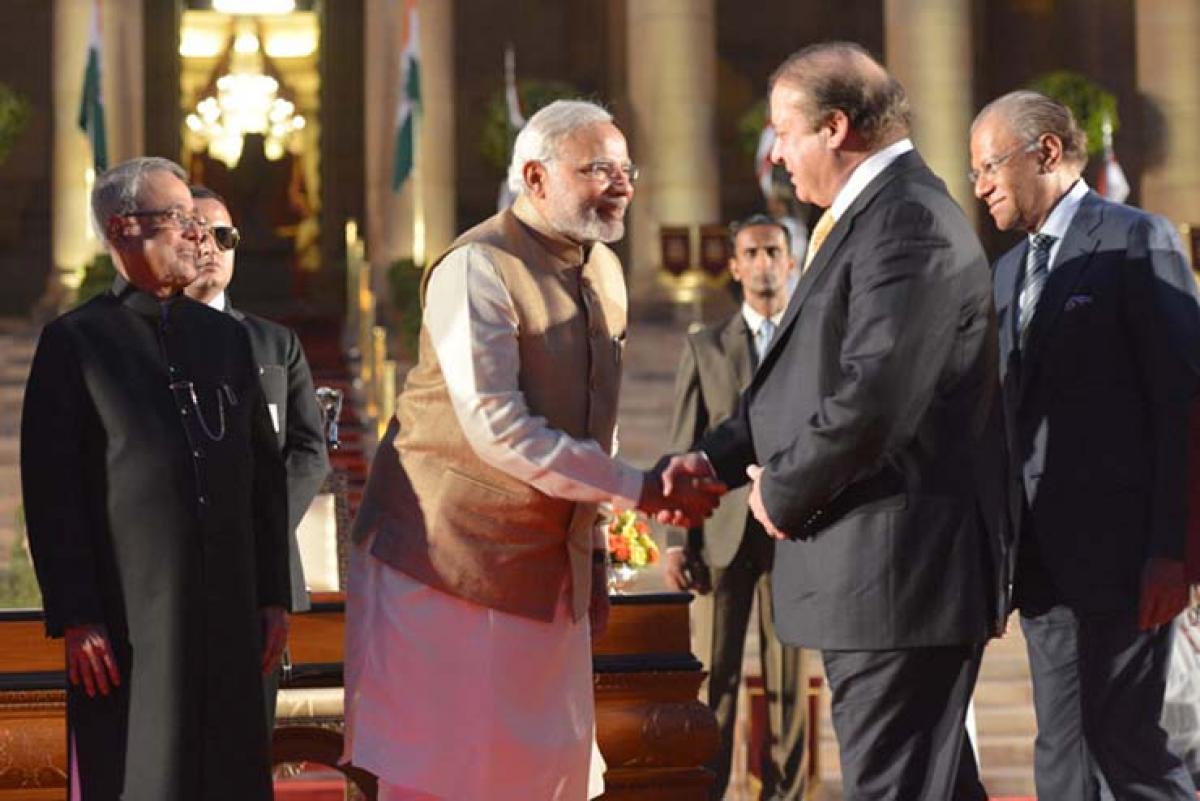Live
- My Dear Donga: trailer get grand launched
- Supreme Court reserves verdict
- Poll battle begins
- Phase 1 polls in 102 seats across 21 states today
- 39 candidates file papers on Day 1
- ED arrests AAP MLA Amanatullah Khan in Waqf Board appointment scam
- LS polls: Union Minister Bhagwanth Khuba, Dingaleshwara seer, Priyanka Jarkiholi file nominations in K'taka
- Amid show of strength, Congress’ Praniti Shinde files nomination from Solapur
- Tamil Nadu Police gives clean report to Isha Foundation in missing volunteers case
- Home Minister Amit Shah to address public meeting in Goa on April 24
Just In

x
Highlights
Challenging the Pakistani establishment, Pakistani playwright Shahid Nadeem has been presenting his plays in India and at home for the past 26 years. But during the current visit, he would have liked to see some dialogue between the governments, he said, adding that even if it does not happen, he will continue with his cultural interaction to break the barriers between the neighbours.
Challenging the Pakistani establishment, Pakistani playwright Shahid Nadeem has been presenting his plays in India and at home for the past 26 years. But during the current visit, he would have liked to see some dialogue between the governments, he said, adding that even if it does not happen, he will continue with his cultural interaction to break the barriers between the neighbours.

"What I would have loved to see in this visit was the dialogue process between the two governments resumed, some interaction beginning. But we cannot wait for the governments to sort out the mess, we have to carry on with the cultural dialogue to break the barriers, for me through theatre," Nadeem told IANS.
Nadeem is in India ahead of the Pakistani Theatre Festival being hosted by Delhi-based NGO Routes 2 Roots from September 14 at which he will present four of his plays relating to the Mughal era.
"Governments need to work more, not just on the Kashmir front or the terrorism front, but also on the cultural front. Without that, an extensive exchange cannot happen," Nadeem said.
The 68 year-old playwright, who was born in Kashmir in 1947, the year India was partitioned, before settling in Lahore, Pakistan, said the cataclysmic event has been the "baggage" he has had to carry ever since.
"The memories of my birth place Kashmir, and the questions of identity, whether I am a Kashmiri, a Punjabi, a Pakistani or an Indian always surround me. Partition has had a huge impact on my work," the playwright said, adding that he grew up looking at his father longing for his homeland - Kashmir.
Reminiscing about one of his plays, "Ek Thi Nani", which cast sisters and actors Zohra Sehgal and Uzra Bhatt, Nadeem said in 1993 his play helped reunite the sisters, who were on either side of the border, after 40 years.
After partition in 1947, Bhatt had moved to Pakistan while Sehgal stayed back in India. His play raises the key questions on how the sisters' lives took different courses and had changed after partition, Nadeem said.
"A lot of my work, somehow, refers to the problems and challenges of partition or the baggage of partition that one has to carry and the desire to promote the cause of peace and goodwill between the people of not only India and Pakistan, but also between the people of Kashmir," Nadeem said.
Another of Nadeem's well-acclaimed plays is on story writer, film writer, author and journalist Saadat Hasan Manto, who opted for Pakistan after partition but later regretted the choice. Manto's works were critical of the political situations which prevailed during and after the partition.
Recalling Manto's way of life and his ideologies, Nadeem said that in one of his articles, Manto said that after his death, he did not want any recognition from the government, and he was afraid that after his death, the government might forcibly plant a medal on his coffin.
"What he did not want happened. In 2012, the Pakistani government conferred on him the country's highest civilian award. This shows contradictions and double standards. Society is still intolerant and people can't digest Manto's ideologies. But with the world acknowledging him, they honour him," Nadeem said.
If Manto lived today, Nadeem said, "he would have been hounded and accused of being an agent or an international conspirator. Such is the intolerance to criticism or dissent in the society today."
Nadeem, who has been associated with Ajoka Theatre of Pakistan since 1988, said over the 26 years he has been coming to India to showcase his plays, he has observed that Indian audiences were more receptive to his plays.
"Although many of my plays are targeted at Pakistani audiences and are in the social context of Pakistan, I have noticed that Indian audiences are more enthusiastic and pick up issues which Pakistani audiences may not have," Nadeem explained about the reception of his shows in India.
Despite the current tension between the two countries, he said his plays have always been received well, adding that a BJP leader in Kerala was impressed by the play and had come to hug the artists on stage.
"The Indian High Commission in Islamabad has been very supportive of our activities. Even two days after the blasts in Mumbai in 2011, when the security was so high, the high commission gave us visas and allowed us to visit India," Nadeem said.
Only NGOs have been engaging in cultural exchanges, he lamented, adding that governments need to sign memorandums to promote sharing of culture.
"Instead of easing the processes to allow cultural exchanges, the two countries have been imposing more restrictions each day. It is frustrating for the NGOs to do it alone, but we will continue our dialogue," Nadeem concluded.

Next Story
More Stories
ADVERTISEMENT
© 2024 Hyderabad Media House Limited/The Hans India. All rights reserved. Powered by hocalwire.com







